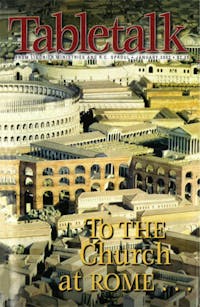
Request your free, three-month trial to Tabletalk magazine. You’ll receive the print issue monthly and gain immediate digital access to decades of archives. This trial is risk-free. No credit card required.
Try Tabletalk NowAlready receive Tabletalk magazine every month?
Verify your email address to gain unlimited access.
I have to say honestly that the book of Romans has caused me a great deal of trouble over the years. At the same time, I also have to say that I am profoundly grateful for this trouble. Although these were difficulties I did not request, a retrospective look is cause for nothing but thanksgiving. Of course, saying that Romans has been a troublemaker is like Ahab calling Elijah a troubler of Israel. The trouble was actually more Ahabian than the king realized.
Describing Romans as troublesome makes one think immediately of “those chapters” in the latter part of the book (8–11). These are the chapters that come perilously close to saying that God is God. This was all a great difficulty “when I was first coming to the Reformed faith,” but this phrase actually sounds far too grand. It would be more accurate to say that when I first noticed that I was being dragged in the Reformed direction by invisible forces beyond my control, “those chapters” troubled my thinking a good deal.
Of course, the sovereignty issues woven throughout these chapters were the most obvious. But though they were foundational to all that followed, they were not the truths that unsettled my world the most. After a time, my new “Calvinism” started to rest on me easily. As a result, I assumed that “those chapters” were now friends to all my doctrinal assumptions. But lurking deep in chapter 11 was more trouble. The lesson there was one I commend to modern evangelicals everywhere. For those interested in keeping their feathers unruffled, the lesson can be avoided easily by reading Romans only occasionally and by concluding that the lesson of the olive tree is that plants grow, or something equally general.
That olive tree overthrew all my assumptions about the relationship of the people of God in the Old Testament to the people of God in the New. Paul presents the image of one olive tree, and uses this image to describe the nature of the people of God in the transition between the old and new covenants. But there is only one tree the entire time. If a certain modern doctrinal assumption is to be believed, God had an olive tree in the Old Testament, but He chopped it down in the first century and now watches over a second tree He planted, which is a peach tree.
But in Paul’s mind, the Jews were the branches on this one tree in the Old Testament, and the root, as always, was Christ. When the Messiah came, many Jews did not believe, so they were cut out of the one olive tree and separated from the covenant people of God. Those Gentiles who believed, wild olive shoots, were grafted into the olive tree. They then were warned, with great solemnity, to remember their brothers, the Jews. If God did not spare them, natural branches as they were, how much less would He spare grafted branches should they fall into the same sin? The root supports the branches, not the other way around.
When the metaphor is allowed to speak to us in the way Paul intended, certain things follow. And these things are unsettling to many of our cherished assumptions. First, covenant membership is not the same thing as individual election. The number of the elect cannot be increased or diminished, and known unto God are all His works from all eternity. But the number of those who are covenant members can be increased and diminished, and this happens all the time. Every time someone is baptized or excommunicated the number changes. Second, covenant membership, even when held by someone who is not elect, is covenant membership. Jesus teaches the same thing in John 15, when He says He is the vine and we are the branches. The branches are then told to abide in Him. Those who do not will be cut off, taken away, and burned.
Far too many exegetes try to say these warnings are hypothetical. They say God warns us about things that never can happen—like posting a big “Beware of the Cliff” sign in the middle of the plains of Kansas. But these warnings are real, and apostasy is true sin, committed by real people. We simply do not want olive branches to be capable of being cut off anymore. In the new covenant, we want all the branches to be made of stainless steel, and we call this eternal security. But the Bible teaches the perseverance of all the elect—not the perseverance of all covenant members. Further, non-elect covenant members have a genuine connection (of some sort) to Jesus Christ. They have to be connected to Him in order to be removed from Him. We do not want to admit genuine connection, so we deny genuine removal. The apostate, we say, is not a branch being removed, but rather a bit of tumbleweed that got stuck in the branches and is now taken out.
In doing this kind of thing, we negate the force of Paul’s warning. He says not to be haughty, but rather to fear. But we rush in to whisper loudly—fear not.
